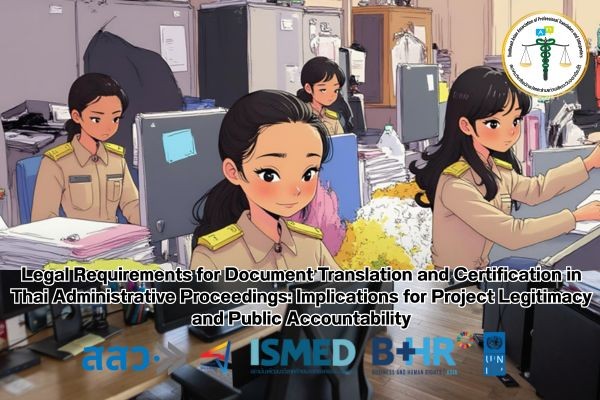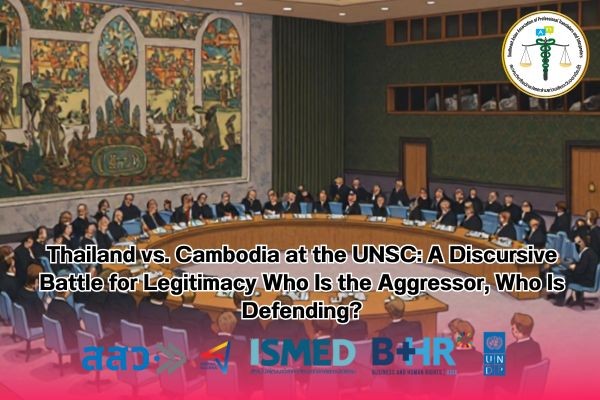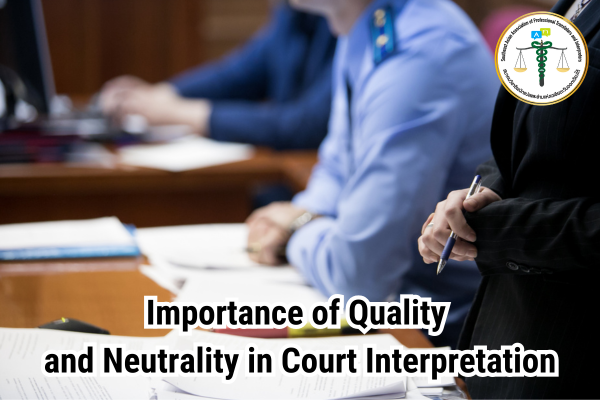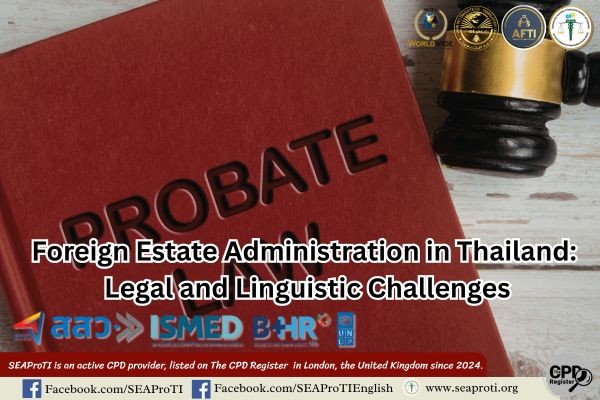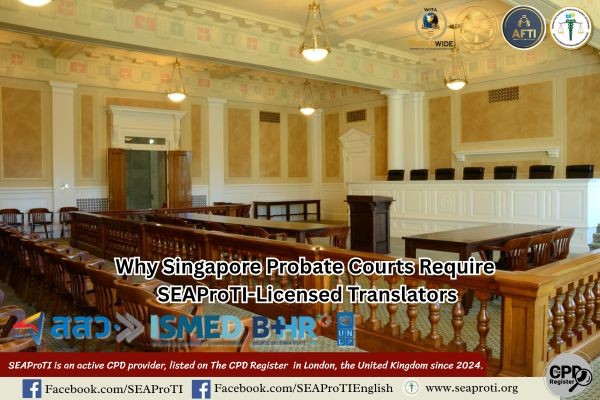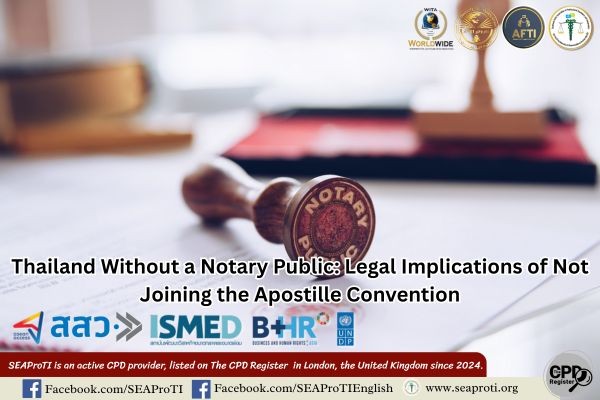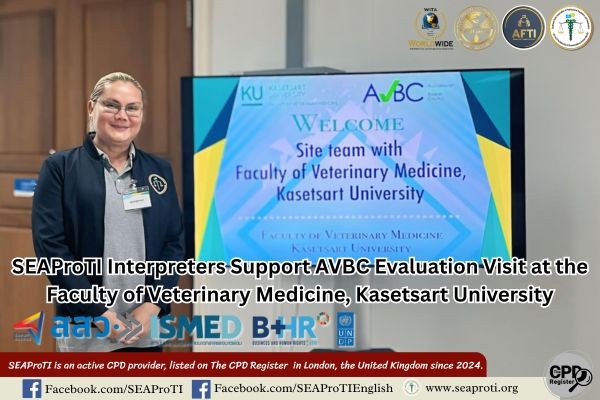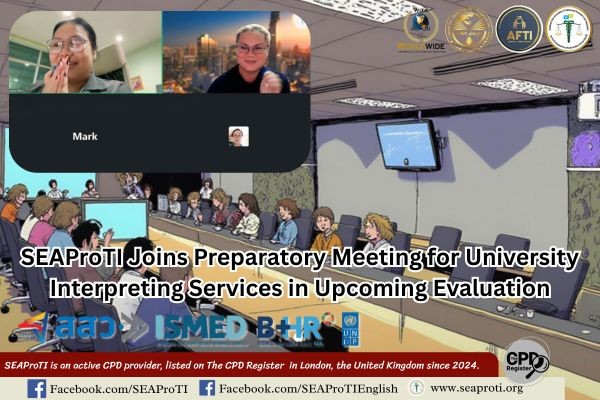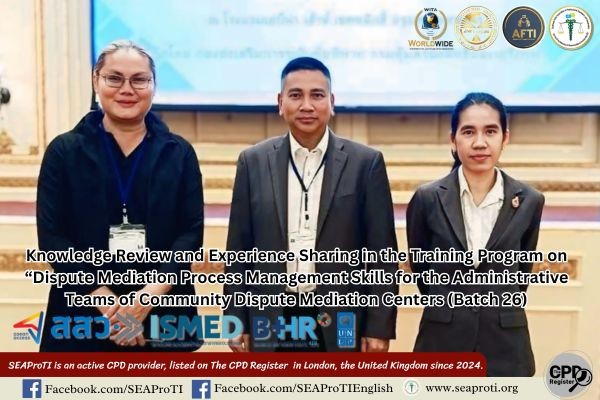Legal Requirements for Document Translation and Certification in Thai Administrative Proceedings:
Implications for Project Legitimacy and Public Accountability
This article examines the regulatory obligations under the 1997 Ministerial Regulation pursuant to the 1996 Thai Administrative Procedure Act concerning official translations and certification of documents submitted to government agencies. It emphasizes the legal duty of officers to inform the public clearly about translation requirements. Failure to do so may constitute misconduct under Section 157 of the Thai Criminal Code. Moreover, if an officer discovers that a submitted document has not been properly translated or certified, the law provides for either its immediate rejection or, if detected post-submission, the termination or suspension of related projects. Examples from infrastructure and foreign investment projects highlight the critical importance of accurate certified translation in preventing administrative error and legal risk.
Introduction
In Thailand, individuals and entities—especially foreign applicants—who submit requests to government agencies often must include translated documents, such as technical reports or contracts. Under the 1997 Ministerial Regulation on Translation and Certification of Official Documents, which implements the Administrative Procedure Act B.E. 2539 (1996), these documents must be accurately translated and certified by qualified professionals. If public officials fail to inform the applicants of this requirement, they may be subject to legal complaints under Section 157 of the Criminal Code, which penalizes malfeasance in office (Office of the Council of State, 1997).
- According to the Ministerial Regulation (1997), administrative officers are required to notify applicants clearly of the criteria for acceptable translations and the process for certification. If such notification is omitted, the applicant may file a complaint alleging official negligence under Section 157 of the Criminal Code (Department of Provincial Administration, 1997).
- When a government officer encounters improperly translated or uncertified documents, they may take one of two actions:
Reject the documents outright, instructing the applicant to resubmit them with proper translation and certification.
If the flaw is discovered after submission or project approval, the officer may suspend or revoke the project to prevent administrative error or fraud.
- Foreign Investment Project in Eastern Industrial Estate
A Japanese company submitted an application to build an electronics factory. Technical documents translated from Japanese to Thai were found to be inaccurate and uncertified. The translation errors involved structural material specifications. As a result, authorities suspended the project until properly certified translations were provided, in line with the 1997 Ministerial Regulation. - Cross-Border Infrastructure Project with China
A bridge construction project across the Mekong River, jointly proposed by Thai and Chinese agencies, included structural blueprints translated from Chinese to Thai. A critical mistranslation occurred: “wet-process bored piles” were incorrectly rendered as “driven piles.” This misrepresentation led to safety concerns, and the Ministry of Transport terminated the project approval until new translations, properly certified, were submitted. - Policy Recommendations
Government agencies should maintain and publish a list of certified translators and certifiers recognized for administrative use.
The requirements for certified translation should be integrated into official handbooks and procedural manuals for officers.
Professional bodies like SEAProTI (Southeast Asian Professional Translators and Interpreters) should collaborate with government agencies to develop standardized certification processes.
- Department of Provincial Administration. (1997). Ministerial Regulation on Translation and Certification of Official Documents B.E. 2540 (1997). Bangkok: Ministry of Interior.
- Office of the Council of State. (1997). Commentary on the Thai Administrative Procedure Act B.E. 2539 (1996). Bangkok: Office of the Council of State.
- Thai Criminal Code. (1997). Section 157: Malfeasance in office. Bangkok: Secretariat of the Cabinet.
SEAProTI’s certified translators, translation certification providers, and certified interpreters:
The Southeast Asian Association of Professional Translators and Interpreters (SEAProTI) has officially announced the criteria and qualifications for individuals to register as “Certified Translators,” “Translation Certification Providers,” and “Certified Interpreters” under the association’s regulations. These guidelines are detailed in Sections 9 and 10 of the Royal Thai Government Gazette, issued by the Secretariat of the Cabinet under the Office of the Prime Minister of the Kingdom of Thailand, dated July 25, 2024, Volume 141, Part 66 Ng, Page 100.
To read the full publication, visit: the Royal Thai Government Gazette
ข้อกำหนดทางกฎหมายเกี่ยวกับการแปลเอกสารและการรับรองคำแปลในการปฏิบัติราชการทางปกครองของไทย:
ผลกระทบต่อความชอบด้วยกฎหมายของโครงการพัฒนา
บทความนี้วิเคราะห์ข้อกำหนดตามกฎกระทรวงปี พ.ศ. 2540 ออกตามพระราชบัญญัติวิธีปฏิบัติราชการทางปกครอง พ.ศ. 2539 เกี่ยวกับหน้าที่ของเจ้าพนักงานในการตรวจสอบความถูกต้องของคำแปลและการรับรองคำแปลของเอกสารที่ยื่นต่อหน่วยงานรัฐ โดยเฉพาะในบริบทของโครงการพัฒนาที่อาศัยเอกสารแปลประกอบการพิจารณา หากเอกสารดังกล่าวไม่ผ่านเกณฑ์ตามที่กฎหมายกำหนด อาจนำไปสู่การเพิกถอนสิทธิ์ ยกเลิกโครงการ หรือการฟ้องร้องเจ้าหน้าที่ตามมาตรา 157 ได้ ทั้งนี้ ยังได้ยกตัวอย่างกรณีศึกษาในโครงการก่อสร้างและการลงทุนที่เกี่ยวข้องกับการแปลเอกสาร
บทนำ
ในระบบราชการไทย การติดต่อราชการโดยบุคคลหรือนิติบุคคลที่มีถิ่นกำเนิดในต่างประเทศ จำเป็นต้องอาศัยเอกสารแปลประกอบการยื่นคำขออนุญาตต่าง ๆ เช่น การขออนุญาตก่อสร้าง การขอรับการส่งเสริมการลงทุน หรือการยื่นข้อเสนอทางวิชาการต่อหน่วยงานของรัฐ ซึ่งตาม กฎกระทรวงว่าด้วยหลักเกณฑ์และวิธีการในการจัดให้มีการแปลเอกสารและรับรองคำแปลเอกสารเพื่อใช้ในราชการ พ.ศ. 2540 ได้กำหนดให้เอกสารแปลต้องแปลโดยผู้เชี่ยวชาญและได้รับการรับรองอย่างถูกต้อง หากหน่วยงานรัฐหรือเจ้าพนักงานละเลยไม่แจ้งหรือไม่ปฏิบัติตาม อาจนำไปสู่การร้องเรียนตาม มาตรา 157 ของประมวลกฎหมายอาญา (สำนักงานคณะกรรมการกฤษฎีกา, 2540)
ขอบเขตของกฎหมายและอำนาจของเจ้าพนักงาน
กฎกระทรวง พ.ศ. 2540 กำหนดให้เจ้าหน้าที่ของรัฐต้องแจ้งให้ประชาชนทราบถึงรูปแบบและวิธีการแปลและรับรองเอกสารอย่างชัดเจน หากไม่แจ้งให้ทราบ ผู้ยื่นคำขอสามารถร้องเรียนว่าเจ้าหน้าที่ละเว้นการปฏิบัติหน้าที่ตามกฎหมายได้ โดยเฉพาะในกรณีที่การไม่แจ้งนั้นทำให้เกิดความเสียหายแก่ผู้ยื่นคำขอ (กรมการปกครอง, 2540)
อำนาจของเจ้าพนักงานเมื่อพบว่าเอกสารแปลไม่ถูกต้อง มี 2 แนวทางหลัก ได้แก่:
- ปฏิเสธการรับเอกสารนั้นไว้พิจารณา และแจ้งให้ผู้ยื่นดำเนินการจัดทำคำแปลใหม่พร้อมรับรองให้ถูกต้อง
- ในกรณีที่ตรวจพบภายหลัง หลังจากเอกสารถูกใช้ประกอบการอนุมัติโครงการไปแล้ว เจ้าพนักงานมีอำนาจในการยกเลิกหรือระงับการดำเนินโครงการได้ทันที เพื่อไม่ให้เกิดผลเสียต่อรัฐหรือสาธารณะ
ตัวอย่างโครงการที่เกี่ยวข้องกับเอกสารแปล
- โครงการลงทุนต่างชาติในนิคมอุตสาหกรรม
- บริษัทจากญี่ปุ่นได้ยื่นขออนุญาตก่อสร้างโรงงานผลิตชิ้นส่วนอิเล็กทรอนิกส์ในนิคมอุตสาหกรรมภาคตะวันออก โดยแนบเอกสารเทคนิคที่แปลจากภาษาญี่ปุ่นเป็นไทย แต่พบภายหลังว่าเอกสารแปลขาดการรับรองโดยนักแปลผู้เชี่ยวชาญ และมีการแปลผิดในข้อกำหนดด้านความปลอดภัยของวัสดุก่อสร้าง ส่งผลให้ต้องระงับโครงการชั่วคราวและดำเนินการจัดทำคำแปลใหม่ให้ถูกต้องตามกฎกระทรวง
- โครงการก่อสร้างสะพานข้ามแม่น้ำภายใต้ความร่วมมือระหว่างประเทศ
- โครงการความร่วมมือระหว่างหน่วยงานของไทยและจีนในการก่อสร้างสะพานข้ามแม่น้ำโขง ได้มีการแนบแบบโครงสร้างทางวิศวกรรมจากภาษาจีนซึ่งแปลเป็นไทย โดยแปลผิดจาก “เสาเข็มเจาะแบบเปียก” เป็น “เสาเข็มตอก” ทำให้แบบก่อสร้างไม่สอดคล้องกับพื้นที่จริง และต้องยกเลิกการอนุมัติโครงการในช่วงต้น เพื่อป้องกันอุบัติเหตุในการก่อสร้าง
ข้อเสนอแนะเชิงนโยบาย
- หน่วยงานภาครัฐควรมี รายชื่อนักแปลและผู้รับรองคำแปลที่ผ่านการรับรอง เผยแพร่แก่ประชาชน
- ควรบรรจุหัวข้อเรื่อง การแปลเอกสารทางราชการ เป็นส่วนหนึ่งของคู่มือปฏิบัติงานเจ้าพนักงาน
- สมาคมวิชาชีพ เช่น SEAProTI อาจมีบทบาทในการจัดทำระบบรับรองคำแปลร่วมกับรัฐเพื่อป้องกันปัญหาทางกฎหมาย
อ้างอิง:
- กรมการปกครอง. (2540). กฎกระทรวงว่าด้วยหลักเกณฑ์และวิธีการในการจัดให้มีการแปลเอกสารและรับรองคำแปลเอกสารเพื่อใช้ในราชการ พ.ศ. 2540. กรุงเทพมหานคร: กระทรวงมหาดไทย.
- สำนักงานคณะกรรมการกฤษฎีกา. (2540). คำอธิบายพระราชบัญญัติวิธีปฏิบัติราชการทางปกครอง พ.ศ. 2539. กรุงเทพมหานคร: สำนักพิมพ์คณะกรรมการกฤษฎีกา.
- ประมวลกฎหมายอาญา. (2540). มาตรา 157: เจ้าพนักงานละเว้นการปฏิบัติหน้าที่. กรุงเทพมหานคร: สำนักเลขาธิการคณะรัฐมนตรี.
เกี่ยวกับนักแปลรับรอง ผู้รับรองการแปล และล่ามรับรองของสมาคมวิชาชีพนักแปลและล่ามแห่งเอเชียตะวันออกเฉียงใต้
สมาคมวิชาชีพนักแปลและล่ามแห่งเอเชียตะวันออกเฉียงใต้ (SEAProTI) ได้ประกาศหลักเกณฑ์และคุณสมบัติผู้ที่ขึ้นทะเบียนเป็น “นักแปลรับรอง (Certified Translators) และผู้รับรองการแปล (Translation Certification Providers) และล่ามรับรอง (Certified Interpreters)” ของสมาคม หมวดที่ 9 และหมวดที่ 10 ในราชกิจจานุเบกษา ของสำนักเลขาธิการคณะรัฐมนตรี ในสำนักนายกรัฐมนตรี แห่งราชอาณาจักรไทย ลงวันที่ 25 ก.ค. 2567 เล่มที่ 141 ตอนที่ 66 ง หน้า 100 อ่านฉบับเต็มได้ที่: นักแปลรับรอง ผู้รับรองการแปล และล่ามรับรอง


